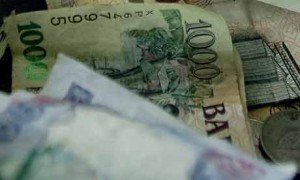By Nasreen Seria and Renee Bonorchis
May 3 (Bloomberg) -- Investment in Africa from countries such as China and India has rekindled optimism in a continent that sits on the world’s biggest deposits of platinum, chrome and diamonds, attracting a record number of delegates to this year’s World Economic Forum on Africa.
Bankers may make up the largest group of delegates as they look to profit from an economy expanding at double the pace of rich nations and a market that has just surpassed 1 billion people. Banks like Barclays Plc and Standard Chartered Plc aim to be dealmakers as rising industrial powers such as China look to the continent to supply raw materials and India buys up land to feed its growing population.
“Africa has a yet-to-be-tapped investment, trade and market potential,” said Kuseni Dlamini, the chief executive officer of Johannesburg-based Old Mutual Plc’s South African unit, the largest African insurer. “I’m always on the look for investment and other value-enhancing opportunities.”
South African President Jacob Zuma, World Trade Organization head Pascal Lamy and Absa Group Ltd. Chief Executive Officer Maria Ramos are some of the more than 1,000 attendees in Dar es Salaam, Tanzania from May 5 to 7.
Sub-Saharan Africa’s economy will probably expand 4.7 percent this year, double the pace of 2009, according to the International Monetary Fund. Commodity exporters, including Angola, which vies with Nigeria as the continent’s largest oil producer, and Botswana, the world’s biggest diamond supplier, will lead the growth.
Capital flows into Africa rose 16 percent in 2008 to a record $62 billion even as foreign direct investment that year fell 20 percent worldwide, according to the World Economic Forum. Standard Chartered said April 23 it plans to offer more securities-related services to its 20,000 corporate clients in Africa, the Middle East and Asia.
China Invests
The conference opens the way for more “deal-flow and investment opportunities in Africa,” said Mike Brown, Chief Executive Officer of Johannesburg-based Nedbank Group Ltd.
While much of the world slid into recession in 2009, Chinese companies signed deals worth at least $600 million in Namibia, Ghana, Kenya and Mozambique in industries from fisheries to paper, according to Bloomberg data. China National Offshore Oil Corp. is now bidding for oil fields in Ghana, Nigeria and Uganda, following investments by other Chinese companies in mining and construction in Zambia and the Democratic Republic of Congo.
“China needs Africa as much as Africa needs China,” said Ridle Markus, Africa strategist at Barclays Plc’s Absa in Johannesburg. “We’re optimistic about the growth outlook for Africa. Commodity prices are supporting that growth and China is driving it.”
Agriculture Spurred
Agricultural loans are another area of growth on the continent, where farming employs 65 percent of the labor force and accounts for 32 percent of gross domestic product, according to the World Bank. Agriculture is being spurred by foreign investment, such as Indian food processing company Karuturi Global Ltd.’s leasing of 300,000 hectares in Ethiopia to produce food for export.
Old Mutual and Futuregrowth Asset Management raised 3 billion rand ($407 million) for a fund this year to buy farmland across the continent. Standard Bank created a 500 million rand black economic empowerment fund to assist emerging farmers in South Africa.
Farming “tends to outperform other economic sectors during a recession with excellent repay ability and low impairments,” said Louis von Zeuner, deputy chief executive officer and head of retail operations at Johannesburg-based Absa.
Corruption
While Africa is bouncing back from last year’s crisis, it is still dogged by poverty, political instability, weak infrastructure and corruption.
African Union officials at a meeting of finance ministers last month agreed to do more to combat illegal financial flows from the continent. A report compiled by research company Global Financial Integrity, and discussed at the meeting, estimated that Africa lost $854 billion in tax evasion and money laundering between 1970 and 2008. That is enough to wipe out the continent’s outstanding debt and leave billions of dollars over for development projects, according to the study.
The World Economic Forum says corruption is “conservatively estimated” to cost Africa more than $148 billion a year, increasing the cost of goods as much as 20 percent. Finding ways for businesses and government to tackle the problem will be the subject of a discussion on May 6, titled “Corruption: the elephant in the room.”
“The outlook for Africa is good, but the old challenges still remain,” said Absa’s Markus. “We need stable politics, stable macroeconomic policies and prudent fiscal policies.”
To contact the reporters on this story: Nasreen Seria in Johannesburg at [email protected]; Renee Bonorchis in Johannesburg at [email protected]











